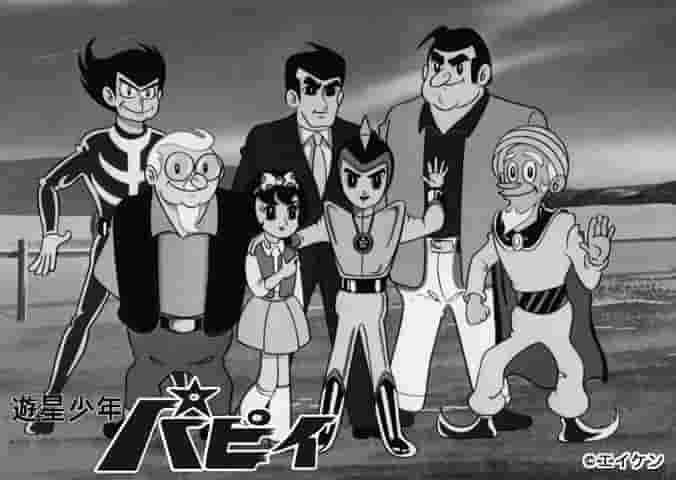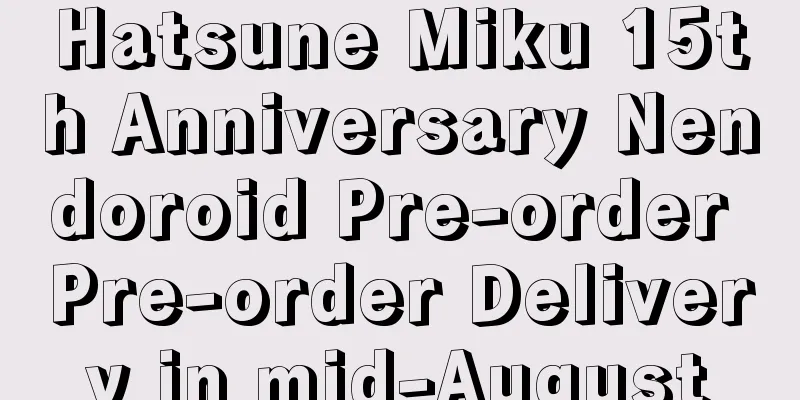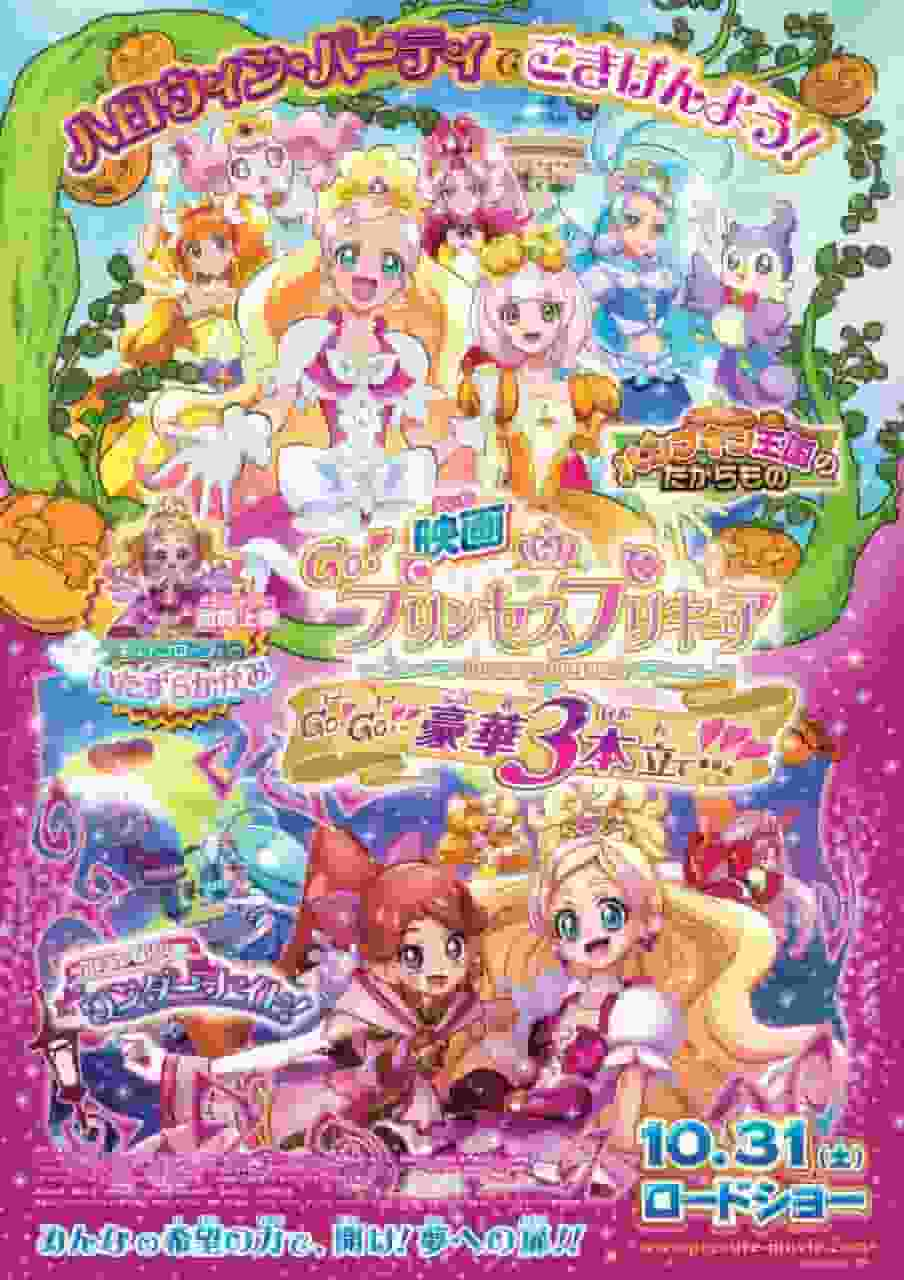The appeal and reviews of "Puppy, the Boy from the Planet": Rediscovering the excitement of space adventures

Planet Boy Papii: Clifton's messenger who protects the Earth■ Public MediaTV anime series ■ Original MediaAnime Original ■ Broadcast period Broadcast every Thursday from June 3, 1965 to May 27, 1966 at 19:00-19:30 *Up to #30 on December 30, 1965 ■Broadcasting stationFuji TV Network ■Frequencieshalf an hour ■ Number of EpisodesEpisode 52 ■Original StoryYoshikura Shoichiro ■ ProductionTCJ (now Aiken) ■Works© Aiken ■ StoryA boy named Papii was sent from the peaceful planet Clifton, which has an advanced civilization, to protect peace on Earth. His goal is to help humanity overcome the conflicts on Earth and lead them to the next stage. Papii usually appears as an Earth boy, but when an incident occurs, he transforms into an alien boy by shouting "Pee, Papii!!" Together with his friends he met on Earth, he confronts an international conspiracy group and aliens plotting to invade Earth. ■ExplanationThe story is about Japan's first life-size hero, and is full of Eiken's signature sci-fi action. Yoshikura Shoichiro, credited as the original author, does not actually exist, but was a pen name made up of each letter of the names of the writers who wrote the screenplay. Although this work was produced as entertainment, it also depicts some hard-hitting aspects, such as Papii wiping his memory of his own volition in order to complete his mission, and his subsequent worries about his origins. ■Cast・Pappy/Yoshiko Fujita, Kiyoko Yamamoto ・Rico/Eiko Masuyama ・Kiritobi/Ichiro Murakoshi ・Ajababa/Yoshihisa Kamo ・Strong/Kazuo Nagayama ・Xenoloy/Reizo Nomoto ・Chacolon/Yozu Fujimoto ■ Main staff・Original work by Shoichiro Yoshikura・Supervision by Sato Okura・Character design by Hideoki Inoue・Chief director of animation by Kazuo Ihara・Direction by Isao Yamamoto, Yonehiko Watanabe, Isao Kawachi, Tadao Wakabayashi・Screenplay by Ichiro Kano, Sato Okura, Masao Yamamura, Akira Adachi, Juzaburo Futaba, Takeyoshi Hikage, and others・Chief animation (chief animator) by Tsuneo Komuro・Chief background (art director) by Shunroku Hoshi・Music by Hidehiko Arashino (TV Kobo) ■ Main Characters・Papi A boy from Clifton. With his brilliant mind and strong sense of justice, he bravely challenges evil. By shouting "Pee, Papi!!", he transforms into Planet Boy and exerts his super powers, allowing him to fly in the sky. ■ Theme songs and music・OP Planet Boy Puppy: Detailed Review and Recommendation■ Background and history of the work"Papii, the Planet Boy," which began airing in 1965, is known as a work that introduced many new ideas to the Japanese animation scene at the time. In particular, its use of a life-sized, transforming hero as the main character had a major impact on later special effects hero programs and anime works. This work was produced by TCJ (now Eiken), and was highly popular among children for its fusion of action scenes with sci-fi elements, which was cutting-edge for the time. The series ran for 52 episodes from June 3, 1965 to May 27, 1966, and was originally aired every Thursday, but was later changed to Friday. This change was made in order to improve the ratings, and it ended up succeeding in attracting a large audience. The original author of the work is said to be Yoshikura Shoichiro, but this is a fictitious name, a pen name created by taking one character from each of the screenwriters' names. This kind of ingenuity shows the enthusiasm of the production team at the time. ■ Story and ThemeThe story of "Poppy, the Planet Boy" is about a boy named Papii who is sent from the peaceful planet Clifton to Earth and struggles to protect the peace of the planet. Papii usually looks like an ordinary boy, but when an incident occurs, he transforms into Planet Boy with the cry of "Pee, Papii!!" and displays superhuman powers. This transformation scene left a strong impression on viewers and can be said to be the prototype for later transforming hero works. The themes of the work are peace, justice, and self-sacrifice. Papii is forced to make the difficult decision of erasing his own memories in order to protect peace on Earth. Such serious elements are rare for a children's anime, and deeply moved viewers. In addition, the friendship and cooperation between Papii and his friends are also important themes, and have resonated with viewers. ■Character AnalysisThe main character, Papii, is a boy with a brilliant mind and a strong sense of justice. His transformed form has a very strong visual impact and has become an object of admiration for children. The performances of Yoshiko Fujita and Kiyoko Yamamoto, who voiced Papii, also enhance the charm of the character. Riko is a girl who lives on the farm where Papii is staying, and she is his emotional support. Her purity and kindness are important factors that support Papii's fight. Ajababa is an Arabian magician, and the scenes in which he uses his magic are visually enjoyable. Strong is a former professional wrestler, and his strength and kindness are portrayed in contrast. Kiritobi is Papii's rival, and the confrontation scene between them is the highlight of the work. ■ Production and Technology"Planet Boy Puppy" was produced by TCJ (now Eiken). The character designs were done by Hideoki Inoue, whose unique touch enriches the worldview of the work. The quality of the work was raised by bringing together the top creators of the time, such as Kazuo Ihara, the animation director, and Shunroku Hoshi, the background chief. The music was composed by Hidehiko Arashino, and the theme song "Yusei Shonen Papii" was sung by Duke Aces. This song played an important role in enhancing the atmosphere of the work. In addition, the insert song "Oyasumi Papii" was sung by Yoko Kishi and Luna Armonico, and left a deep impression on viewers. ■ Viewer reactions and impact"Puppy the Planet" has had high viewer ratings since it was first broadcast, and has been extremely popular among children. In particular, Puppy's transformation and action scenes left a strong impression on viewers. The show's themes of peace, justice, and self-sacrifice deeply touched viewers, and created many fans. This work had a major influence on later transforming hero works. In particular, the fact that it featured a life-sized transforming hero as the main character became the prototype for later special effects hero programs and anime works. In addition, the fusion of science fiction elements and action scenes breathed new life into the world of Japanese anime at the time. ■ Recommendations and ratings"Papii the Planet Boy" was an innovative work in the world of Japanese animation in the 1960s, and made a strong impression on viewers. In particular, Papii's transformation and action scenes are visually very enjoyable. Furthermore, the themes of peace, justice, and self-sacrifice deeply touch viewers. This work can be recommended to a wide range of people, from children to adults. In particular, it is a must-watch for those who like transforming heroes and science fiction works. It is also recommended for those who are interested in the history and production background of the Japanese anime industry at that time. Overall, it is a work that can be highly evaluated in all aspects, including the story, characters, production techniques, and audience reaction. "Papii" is a representative work of the Japanese animation world of the 1960s, and its influence continues to this day. Please watch it at least once and feel its charm. |
<<: The appeal and evaluation of W3: A deep review
>>: "Castle Ruins": Reevaluating the moving songs of everyone
Recommend
Evaluation and impressions of Doraemon's traffic safety education animation "Don't jump out" Part II
Traffic Safety, Doraemon, Part II: Stop Jumping O...
The appeal and reviews of "Weekly Shimako": A must-see anime guide
Weekly Shimako - Weekly Shimako ■ Public Media TV...
Horror movies are back on the rise, and the screenwriter of "Aquaman" is obsessed with "A Nightmare on Elm Street"
Michael Myers is back, so how far can Freddy be? ...
Douban's Top Ten High-scoring Foreign Language Films of 2023: Oppenheimer Tops the List
Douban's top ten high-scoring foreign-languag...
The appeal and reviews of "Bushiroad: The Complete Edition of Neppu Kairiku": If you're looking for the ultimate combat experience, this is it!
Nepfu Kairiku Bushiroad Complete Edition - Detail...
My matchmaking partner is my student, a strong-willed, problematic child, complete edition - Impressions and reviews that delve into the strengths and problems of my student
Appeal and evaluation of "My Matchmaking Par...
Sony is developing three movies and seven TV series based on PlayStation games
Recently, in an interview with the media, the cha...
Awesome! A 17-meter-long "Space Battleship Yamato" made of straw is unveiled
"Space Battleship Yamato", the represen...
The protagonist of the animated film "The Witcher: Wolf's Nightmare" is not Geralt
Netflix's TV series "The Witcher" h...
The appeal and reviews of "Piyodamari": The perfect balance of healing and laughter
The appeal and evaluation of "Piyodamari - P...
DreamWorks Animation's The Boss Baby 2 is delayed to September 17 next year
According to foreign media THR, the animated film...
The appeal and evaluation of "Maoyuu: The Devil is a Hero": A unique world view and character depth
"Maoyu: The Hero and the Demon King": A...
The second season of "Pirates of the Caribbean" will premiere in January 2023
The official TV animation of "Pirate Chronic...
Disney's new version of "The Little Mermaid" finally starts filming after multiple delays
Disney's new live-action version of "The...
A thorough analysis of the appeal and emotion of "The Melody the Wind Gatards"! Reevaluating the masterpiece from "Minna no Uta"
The melody the wind gave me - Everyone's song...









